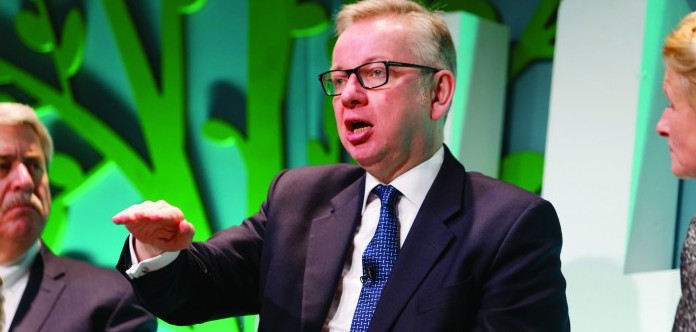Defra Secretary Michael Gove has outlined plans to use funding under a future domestic agricultural policy to incentivise higher welfare standards on farms.
Speaking at the NFU conference on Tuesday, Mr Gove expanded on his vision to target funding under a future agricultural policy at ‘public goods’.
He reiterated that the bulk of this funding would be targeted at improving the environment, but stressed there were ‘other public goods we should also use public money to secure’. These included investing in research and development ‘to improve productivity and to bring further environmental benefits’ and investing in the potential of new technology, for example, to deliver a multi-species Livestock Information Programme. Public access and support that recognises the cultural importance of farming in some parts of the country was also mentioned.
Mr Gove added: “I also believe investing in higher animal welfare standards and in improved training and education for those in agriculture and food production are clear public goods.
“We already, as everyone here knows, have a high baseline for animal health standards, which we will continue to enforce.
“However, we could also support industry-led initiatives to improve these standards, especially in cases where animal welfare remains at the legislative minimum. This could include pilot schemes that offer payments to farmers delivering higher welfare outcomes, or payments to farmers running trial approaches and technologies to improve animal welfare that are not yet industry standard.”
Mr Gove also reiterated his insistence that the UK would not compromise its welfare and environmental standards under new post-Brexit trade deals. He said: “We will not lower environmental or animal welfare standards as part of any new trade deals. We should no more lower our standards than the best brands in any market would lower theirs. Indeed, together, we should aim higher.”
In his final conference speech before stepping down as NFU president on Wednesday, Meurig Raymond highlighted farming’s story as a ‘responsible long-term steward of the countryside and as an acknowledged world leader in animal welfare’.
“Food is at the heart of the British countryside; it’s at the heart of the British economy. British farming produces a safe, affordable and high quality supply of food,” said Mr Raymond.
The NFU has outlined its vision for a successful Brexit for British food and farming, with a focus on environment, productivity and building resilience to volatility outlined as the three policy cornerstones needed for farming’s future outside the EU.
Mr Raymond said: “Time is running out. To use a farming analogy, those three cornerstones outlined in our vision are three legs of a milking stool. There’s a lot of spilt milk if you remove one of them.
“We must have frictionless trade with the EU. Everything else, including the final shape of any domestic agricultural policy, is dependent on that. And of course, those who advocate a cheap food policy, of scouring the world for low cost food should bear in mind the price paid in traceability, in standards and in the off-shoring of environmental impact.
“And to deliver farming’s true potential for Britain we must have a trading environment that helps, not hinders. We must have a food supply chain which shares the risk equally – rather than piling all the risk onto the farmer.
“British farmers are extremely proud of the standards they adhere to – most of them linked to the Red Tractor, which ensures the very best in traceability. We mustn’t let those standards slip and be undermined by a bad trade deal during Brexit negotiations.
“Britain’s farms need access to the EU market, we need access to a reliable workforce and we need measures to help our food and farming industry be more productive.”




